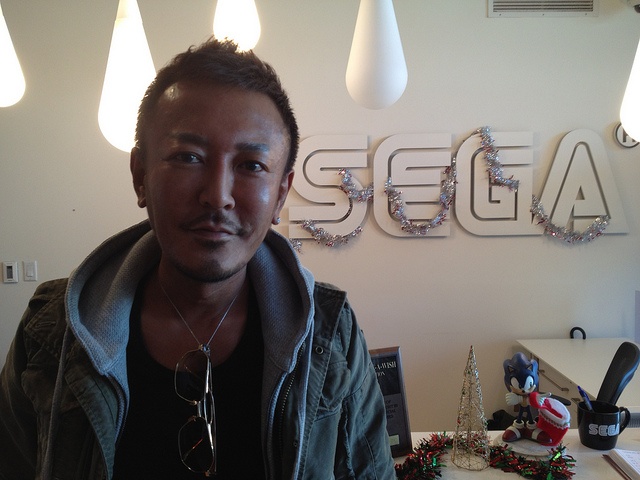Famitsu recently assembled a panel of prominent Japanese gaming industry names and asked them for their thoughts on the trajectory of the Japanese gaming industry in the near and far futures. One such person interviewed by Famitsu is Sega’s Toshihiro Nagoshi. Some of the other names polled that our readers may know include Platinum Games’ Hideki Kamiya, Bandai Namco Entertainment’s Katsuhiro Harada, Square-Enix’s Yoshinori Kitase, and Koei-Tecmo’s Yosuke Hayashi. Nichegamer was gracious enough to translate some of the more salient points made in the interview.
Nagoshi’s thoughts are interesting. He’s pretty at ease as far as developing on the Playstation 4 is concerned, noting that it’s a powerful machine (albeit adding that the jump between the PS4 and the PS4 isn’t extremely monumental) and that there shouldn’t be much difficulty utilizing its architecture. Some of our readers may remember that the Playstation 3 wasn’t adopted so readily upon its launch.
The most pressing concern is the costliness of development. Nagoshi would prefer that fans not have to worry too much about such a concern (but who can blame us?) and ideally the fans can focus on the games themselves. He doesn’t think most other Japanese developers can confidently predict when enough gamers will buy PS4’s to warrant a shift away from cross-gen development. That being said, in the near future the Playstation 4 is going to be a major focal point.
Nagoshi expects sales within Asia (outside of Japan) to double Japan’s numbers, and states that understanding that Yakuza is a Japanese-focused franchise, Sega can’t “pin all their hopes and dreams on such a Japanese game.” Sega has of course been putting more of their Japanese games in Asia or localizing them into Chinese. But that’s still an interesting comment. It’s definitely true that Yakuza is inseparable from Japan as an inspiration, but in my mind it sort of suggests that Japan at the moment isn’t culturally integrated, or globalized, enough for a high-end game with Japanese sensibilities to be made without it being risky. Which might speak to the hit-and-miss localization record that we note nowadays. But it also makes you ask – what are the Japanese sensibilities exactly that risk alienating the world at large? Is it something we see visually, in game design, or is it purely in cultural references?
It also makes you ask what makes Japanese games risky in a global space. This sort of discussion isn’t seen in relation to Western consumption. The average US gamer apparently spends about $80 a year (a decrease from last year) on gaming, a trend that follows the greater adoption of games that are free to play or sold at lower price points. If we assume that to be true, that would be alarming for a console-focused company considering these games are sold at $40-60. The obvious consequence is that such priced titles are being gradually understood as “niche spaces” by companies.
In any case, in the near future the console space is going to be seen as something to help move the company move forward. He thinks that consoles are a sort of in-between space with smartphones on one side and PC gaming on the other. But in a decade, Nagoshi isn’t sure that have a secure, easy space ahead as we may understand it.
Two major factors to keep in mind are that console game development is expensive (and increasingly so) and that confidence in Japanese retail consumption is continually weakening, which has been observable for quite some time due to Japan’s economic struggles. Looking at Media Create numbers has been, in my opinion, depressing for quite some time. Changes in either of the above two elements could positively impact the Japanese gaming industry in my opinion.
In any case, I highly suggest you read the nichegamer article linked at the top! Not everyone produces the same answers, and some give different issues their focus.
Featured image courtesy of this gamestar.hu article.


I’d be happy with Google machine translations of a lot of Japanese games. Put out over a weekend.
just saying, is all. Mainly just need the menus and items translated..